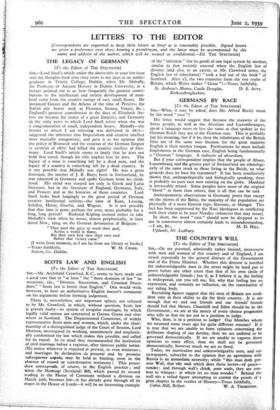LETTERS TO THE EDITOR
[Correspondents are requested to keep their letters as brief as is reasonably possible. Signed letters are given a preference over those bearing a pseudonym, and the latter must be accompanied by the .name and address of the author, which will be treated as confidential.—Ed. THE SPECTATOR] THE LEGACY OF GERMANY [To the Editor of THE SPECTATOR] SIR,—Lord Snell's article under the above title in your last issue sent my thoughts back over sixty years to my days as an under- graduate in Trinity College, Dublin, when Dr. Mahaffy,
the Professor of Ancient History in Dublin University, in a lecture pointed out to us how frequently the greatest contri- butions to the intellectual and artistic development of man- kind came from the creative energy of very small States. He instanced Greece and the Athens of the time of Pericles; the Italian city States such as Florence, Sienna, Venice, &c. ; England's greatest contribution in the days of Elizabeth (be- fore she became the centre of a great Empire); and Germany in the sixty years to which Lord Snell refers when she was a conglomeration of small, independent States. Mahaffy—the lecture to which I am referring was delivered in 1877— suggested the inference that Imperialism and creative intellect were mutually antagonistic, and gave it as his opinion that the policy of Bismarck and the creation of the German Empire (a creation of 1871) had killed the creative intellect of Ger- many. Lord Snell's article seems to imply that he does not hold that creed, though his title implies that he does. The legacy of a man is something left by a dead man, and the legacy of a country is something left by a dead country. Is it not possible that Mahaffy was right? He was a great historian, the teacher of J. B. Bury; born in Switzerland, he was educated in Germany and spoke German from his child- hood. His mind was steeped not only in Greek and Latin literature, but in the literature of England, Germany, Italy, and France; and in the histories of those countries. Lord Snell looks back longingly to the great period of German creative intellectual activity—the time of Kant, Lessing, Schiller, Heine, Goethe, and Wagner. Is it not possible that that time is gone, perhaps for ever, more probably for a long, long period? Rudyard Kipling seemed rather to take Mahaffy's view when he wrote, almost prophetically, in lines dated Nov., 1914, on the German devastation of Belgium:
" They paid the price to reach their goal, Across a world in flame,
But their own hate slew their own soul Before that victory came."
[I write from memory, as I am far from my library or books.]










































 Previous page
Previous page